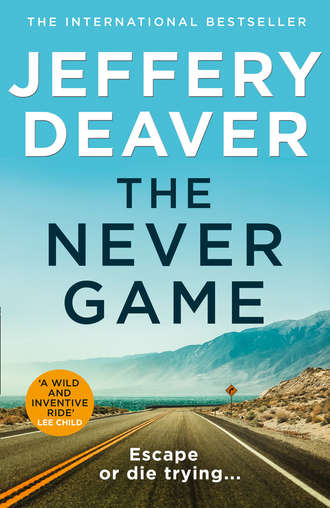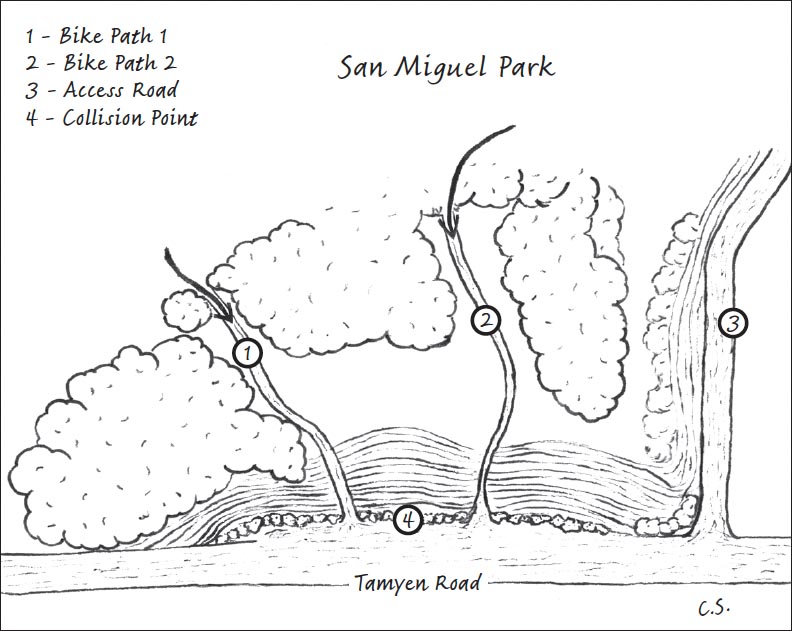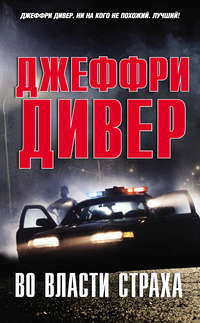
Полная версия
The Never Game

Some brush had been trampled near the plastic shard. He stepped off the shoulder and peered down the hill. He could see a line of disturbed grass leading directly from where he was standing to the bottom of a small ravine. Maybe the plan hadn’t gone quite as X had hoped. Maybe he’d struck Sophie’s bike too hard, knocking her over the edge, and she’d tumbled down the forty-five-degree slope.
Shaw strode down one path to the place where she would have landed. He crouched. Broken and bent grass, and gouges in the dirt that might have come from a scuffle. Then he spotted a rock the size of a grapefruit. There with a smear on it: brown, the shade of dried blood.
Shaw pulled out his phone and dialed a number he’d programmed in several hours ago. He hit CALL. About ten feet up the hill came a soft sound, repeated every few seconds. It was the Samsung whistling ringtone.
The phone number he’d dialed was Sophie’s.
11.
Now, time for the experts.
Shaw called Frank Mulliner and told him what he’d found.
The man greeted the news with a gasp.
“Those sons of bitches!”
Shaw didn’t understand at first. Then he realized Mulliner was referring to the police.
“If they’d gotten on board when they should have … I’m calling them now!”
Shaw foresaw disaster: a rampaging parent. He’d seen this before. “Let me handle it.”
“But—”
“Let me handle it.”
Mulliner was silent for a moment. Shaw imagined the man’s mobile was gripped in white, trembling fingers. “All right,” Sophie’s father said. “I’m heading home.”
Shaw got the names of the detectives whom Mulliner had first spoken to about Sophie’s disappearance: Wiley and Standish of the Joint Major Crimes Task Force, based in nearby Santa Clara.
After disconnecting with Mulliner, Shaw called the JMCTF’s main number and asked for either of them. The prim-voiced desk officer, if that was her job title, said they were both out. Shaw said it was an emergency.
“You should call nine-one-one.”
“This is a development in a case Detectives Standish and Wiley are involved in.”
“Which case?”
Of course, there was none.
“Can you give me your address?” Shaw asked.
Ten minutes later he was headed for the JMCTF headquarters.
There’s no shortage of law enforcement in California. Growing up in the eastern wilderness of the state, the Shaw family had contact with park rangers—the Compound abutted tens of thousands of acres of state and federal forest. The family was no stranger to other agencies either: state police, the California Bureau of Investigation and, on rare occasion, the FBI. Not to mention Sheriff Roy Blanche.
The JMCTF was new to Colter Shaw. In a brief online search he’d found that it was charged with investigating homicides, kidnappings, sexual assaults and larcenies in which an injury occurred. It had a small drug enforcement group.
He was now approaching the headquarters: a large, low ’50s-style building on West Hedding Street, not far from the Santa Clara County Sheriff’s Office. He steered the Chevy into the lot and walked along the curving sidewalk bordered with succulents and red flowers, hearing the persistent rush of traffic on the Nimitz Freeway. At the front desk, he walked up to the window behind which a blond uniformed officer sat.
“Yessir?”
He knew the voice. It was the same young woman who’d fielded his earlier call. She was calm and stodgy. Her face was pert.
He asked again for either Detective Wiley or Detective Standish.
“Detective Standish is still out. I’ll see if Detective Wiley is available.”
Shaw sat in an orange-vinyl-and-aluminum chair. The waiting room was like a doctor’s office, without the magazines … and with bulletproof glass protecting the receptionist.
Shaw opened his computer bag, extracted his bound notebook and began to write. When he was done, he walked to the desk officer. The woman looked up.
“Could you please make me a copy of this? It’s for an investigation Detective Wiley’s running.”
Or, is soon to be running.
Another pause. She took the notebook, did as he’d requested and returned the notebook and copies to him.
“Many thanks.”
As soon as Shaw sat down, the door clicked open and a large man in his mid-forties stepped into the waiting area.
The plainclothes officer was an inverted pyramid: broad shoulders and a solid chest, testing the buttons of his shirt, tapering to narrow hips. Had to have played football in school. His salt-and-pepper hair was thick and swept back from a high forehead. The proportioned bulk, hair, along with the eagle’s beak nose and solid jaw, could have landed him a role as a detective in a thriller movie. Not the lead but the dependable—and often expendable—sidekick. His weapon was a Glock and it rode high on the hip.
His eyes, muddy brown, looked Shaw up and down. “You wanted to see me?”
“Detective Wiley?”
“Yes.”
“Colter Shaw.” He rose and extended his arm, forcing a handshake. “You got a call from Frank Mulliner about his daughter, Sophie. She disappeared on Wednesday. I’m helping him find her. I’ve found some things that make it clear she was kidnapped.”
Another pause. “‘Helping him find her.’ You’re a friend of the family?”
“Mulliner offered a reward. That’s why I’m here.”
“Reward?”
Wiley was going to be a problem.
“You’re a PI?” the detective asked.
“No.”
“BEA?”
“Not that either.” Bond enforcement agents are highly regulated. One reason not to go down that road. Also, Shaw had no desire to chase Failure to Appears in Piggly Wiggly parking lots, cuff them and haul their sweaty bodies to the grim receiving docks of sheriffs’ departments.
Shaw continued: “This is urgent, Detective.”
Another scan. Wiley waited a moment and said, “You’re not armed?”
“No.”
“Come on back to the office. We’ll just have a look in that bag first.”
Shaw opened it. Wiley prodded and then turned and walked through the security doorway. Shaw followed him along the functional corridors, past offices and cubicles populated with about fifteen men and women—slightly more of the former than latter. Uniforms—all gray—prevailed. There were suits too, as well as the scruffy casual garb of those working undercover.
Wiley directed him into a large, austere office. Minimal décor. On the open door were two signs: DET. D. WILEY and DET. L. STANDISH. The desks were in the corners of the rooms, facing each other.
Wiley sat behind his, the chair creaking under his weight, and looked at phone message slips. Shaw sat across from him, on a gray metal chair whose seat was not molded for buttocks. It was extremely uncomfortable. He supposed Wiley perched suspects there while he conducted blunt interrogations.
The detective continued to adeptly ignore Shaw and studied the message slips intently. He turned away and typed on his computer.
Shaw grew tired of the pissing game. He took Sophie’s cell phone, wrapped in Kleenex, from his pocket and set it on Wiley’s desk. It thunked, as he’d intended. Shaw opened the tissue to reveal the cell.
Wiley’s narrow eyes narrowed further.
“It’s Sophie’s mobile. I found it in San Miguel Park. Where she’d been cycling just before she disappeared.”
Wiley glanced at it, then back to Shaw, who explained about the video at the Quick Byte Café, the possibility of the kidnapper following her, the park, the car’s collision with the bike.
“A tracker?” That was his only response.
“Maybe. I’ve got a copy of the video and you can see the original at the Quick Byte.”
“You know Mulliner or his daughter before this reward thing?”
“No.”
The detective leaned back. Wood and metal creaked. “Just curious about your connection with all this. It’s Shaw, right?” He was typing on his computer.
“Detective, we can talk all about my livelihood at some point. But right now we need to start looking for Sophie.”
Wiley’s eyes were on the monitor. He’d probably found some articles in which Shaw was cited for helping police find a fugitive or locate a missing person. Or checking his record, more likely, and finding no warrants or convictions. Unless, of course, the powers that be at Cal had learned he was behind the theft of the four hundred pages yesterday from their hallowed academic halls, and he was now a wanted man.
No handcuffs were forthcoming. Wiley swung back. “Maybe she dropped it. Didn’t want to go home because Dad’d paid eight hundred bucks for it. She went to stay with a friend.”
“I found indications there’d been a scuffle. A rock that might have blood on it.”
“DNA is taking us twenty-four hours minimum.”
“It’s not about confirming it’s Sophie’s. It suggests that she was attacked and kidnapped.”
“Were you ever law enforcement?”
“No. But I’ve assisted in missing-person cases for ten years.”
“For profit?”
“I make a living trying to save people’s lives.”
Just like you.
“How much is the reward?”
“Ten thousand.”
“My. That’s some chunk of change.”
Shaw extracted a second bundle of tissue. This contained the small triangular shard of red reflector, which he believed had come from Sophie’s bike.
“I picked them both up with tissues, this and the phone. Though the odds of the perp’s prints being on them are low. I think after she fell down the hill she was trying to call for help. When the kidnapper came after her, she pitched the phone away.”
“Why?” Wiley’s eyes strayed to a file folder. He extracted a mechanical pencil and made a note.
“Hoping that when a friend or her father called, somebody’d find it and they could piece together that she’d been kidnapped.” He continued: “I marked where I found it. I can help your crime scene team. Do you know San Miguel Park? The Tamyen Road side?”
“I do not.”
“It’s near the Bay. There aren’t a lot of places a witness might’ve been but I spotted some businesses on the way to the park. Maybe one of them has a CCTV. And there’s a half dozen traffic cams on the route from the Quick Byte to San Miguel. You might be able to piece together a tag number.”
Wiley jotted another note. The case or a grocery list?
The detective asked, “When do you collect your money?”
Shaw rose and picked up the phone and the bit of plastic, put them back in his bag. Wiley’s face flashed with astonishment. “Hey there—”
Shaw said evenly, “Kidnapping’s a federal offense too. The FBI has a field office here, in Palo Alto. I’ll take it up with them.” He started for the door.
“Hold on, hold on, Chief. Take it easy. You gotta understand. You push the kidnap button, a lot of shit happens. From brass down to the swamp of the press. Take a bench there.”
Shaw paused, then turned and sat down. He opened his computer bag and extracted the copy of the notes he’d jotted while waiting for Wiley. He handed the sheets to the detective.
“The initials FM is Frank Mulliner. SM is Sophie. And the CS is me.”
Obvious, but in Wiley’s case Shaw wasn’t taking any chances.
Missing individual: Sophie Mulliner, 19
Site of kidnapping: San Miguel Park, Mountain View, shoulder of Tamyen Road
Possible scenarios:
• Runaway: 3% (unlikely because of her phone, the reflector chip and evidence of struggle; none of her close friends—8 interviewed by FM—give any indication she’s done this).
• Hit-and-run: 5% (driver probably would not have taken her body with him).
• Suicide: 1% (no history of mental issues, no previous attempts, no suicidal communication, doesn’t fit with scene in San Miguel Park).
• Kidnapping/murder: 80%.
• Kidnapped by former boyfriend Kyle Butler: 10% (somewhat unstable, possibly abusive, drug history, didn’t take breakup well; hasn’t returned calls of CS).
• Killed in gang initiation: 5% (MT-44 and several Latino gangs active in area, but crews generally leave corpses in public as proof of kill).
• Kidnapped by FM’s former wife, Sophie’s mother: <1% (Sophie is no longer a minor, the divorce happened seven years ago, criminal records and other background check of mother make this unlikely).
• For-profit kidnapping: 10% (no ransom demand, they usually occur within 24 hours of abduction; father isn’t wealthy).
• Kidnapped to force FM to divulge sensitive information from one of his two jobs: 5% (one, middle management in automotive parts sales; the other, warehouse manager with no access to sensitive or valuable information or products). Would expect contact by now.
• Kidnapped to force Sophie to divulge information about her part-time job as coder at software development company, GenSys: 5% (does work not involving classified information or trade secrets).
• Killed because she witnessed a drug sale between boyfriend, Kyle Butler, and dealer who didn’t want identity known: 20% (NOTE: Butler is missing too; related victim?).
• Kidnapped/killed by antisocial perpetrator, serial kidnapper or killer; SM raped and murdered or kept for torture and sex, eventual murder: 60%–70%.
• Unknown motive: 7%.
Relevant details:
• SM’s credit cards have not been used in two days; FM is on cards and has access.
• Quick Byte Café has video of possible suspect following her. Manager has preserved original and uploaded to cloud. Tiffany Monroe. CS has copy.
• Under expectation-of-privacy laws, FM cannot access her phone log.
• Perpetrator possibly put tracking device on bike to follow her.
• Mulliner’s house just on market, no prospective buyers yet to case the location for kidnapping potential.
The detective’s carefully shaved face wore a frown. “The hell all this come from, Chief?”
The nickname rankled but Shaw ignored it; he was making headway. “The information?” He shrugged. “Facts from her father, some legwork of mine.”
Wiley muttered, “What’s with the percentages?”
“I rank things in priority. Tells me where to start. I look at the most likely first. That doesn’t pan out, I move to the next.”
He read it again.
“They don’t add up to a hundred.”
“There’s always the unknown factor—that something I haven’t thought of’s the answer. Will you send a team to the park, Detective?”
“Alrightyroo. We’ll look into it, Chief.” He smoothed the copy of Shaw’s analysis and shook his head, amused. “I can keep this?”
“It’s yours.”
Shaw set the cell phone and the chip of reflector in front of Wiley.
His own phone was humming with a text. He glanced at the screen, noted the word Important! Slipped the mobile away. “You’ll keep me posted, Detective?”
“Oh, you betcha, Chief. You betcha.”
12.
At the Quick Byte Café, Tiffany greeted him with a troubled nod.
It was she who’d just texted, asking if he could stop by.
Important! …
“Colter. Come here.” They walked from the order station to the bulletin board on which Frank Mulliner had tacked up Sophie’s picture.
The flyer was no longer there. In its place was a white sheet of computer paper, 8½ by 11 inches. On it was an odd black-and-white image, done in the style of stenciling. It depicted a face: two eyes, round orbs with a white glint in the upper-right-hand corner of each, open lips, a collar and tie. On the head was a businessman’s hat from the 1950s.
“I texted as soon as I saw, but whoever it was might’ve taken it anytime. I asked everybody here, workers, customers. Nothing.”
The corkboard was next to the side door, out of view of the camera. No help there.
Tiffany gave a wan smile. “Madge? My daughter? She’s pissed at me. I sent her home. I don’t want her here until they find him. I mean, she bikes to work three, four times a week too. And he was just here!”
“Not necessarily,” Shaw said. “Sometimes people take Missing posters for souvenirs. Or, if they’re after the reward themselves, they throw it out to narrow the field.”
“Really? Somebody’d do that?”
And worse. When the rewards hit six digits and up, reward seekers found all sorts of creative ways to discourage competition. Shaw had a scar on his thigh as proof.
This eerie image?
Was it an intentional replacement, tacked up by the kidnapper?
And if so, why?
A perverse joke? A statement?
A warning?
There were no words on it. Shaw took it down, using a napkin, and slipped it into his computer bag.
He looked over the clientele, nearly every one of them staring at screens large and screens small.
The front door opened and more customers entered, a businessman in a dark suit and white shirt, no tie, looking harried; a heavyset woman in blue scrubs; and a pretty redhead, mid-twenties, who looked his way quickly, then found an empty spot to sit. A laptop—what else?—appeared from her backpack.
Shaw said to Tiffany, “I saw a printer in your office.”
“You need to use it?”
He nodded. “What’s your email?”
She gave it to him and he sent her Sophie’s picture. “Can you make a couple of printouts?”
“Sure.” Tiffany did so and soon returned with the sheets. Shaw printed the reward information at the bottom of one and tacked it back up.
“When I’m gone, can you move the camera so it’s pointed this way?”
“You bet.”
“Be subtle about it.”
The woman nodded, clearly still troubled about the intrusion.
He said, “I want to ask if anybody’s seen her. That okay?”
“Sure.” Tiffany returned to the counter. Shaw detected a change in the woman; the thought that her kingdom here had been violated had turned her mood dark, her face suspicious.
Shaw took the second printout Tiffany had made and began his canvass. He was halfway through—with no success—when he heard a woman’s voice from behind him. “Oh, no. That’s terrible.”
Shaw turned to see the redhead who’d walked into the café a few minutes ago. She was looking at the sheet of paper in his hand.
“Is that your niece? Sister?”
“I’m helping her father find her.”
“You’re a relative?”
“No. He offered a reward.” Shaw nodded toward the flyer.
She thought about this for a moment, revealing nothing of her reaction to this news. “He must be going crazy. God. And her mother?”
“I’m sure. But Sophie lives here with her father.”
The woman had a face that might be called heart-shaped, depending on how her hair framed her forehead. She was constantly tugging the strands, a nervous habit, he guessed. Her skin was the tan of someone who was outside frequently. She was in athletic shape. Her black leggings revealed exceptional thigh muscles. He guessed skiing and running and cycling. Her shoulders were broad in a way that suggested she’d made them broad by working out. Shaw’s exercise was also exclusively out of doors; a treadmill or stair machine, or whatever they were called, would have driven a restless man like him crazy.
“You think something, you know, bad happened to her?” Her green eyes, damp and large, registered concern as they stared at the picture. Her voice was melodic.
“We don’t know. Have you ever seen her?”
A squint at the sheet. “No.”
She shot her eyes down toward his naked ring finger. Shaw had already noticed the same about hers. He made another observation: she was ten years younger than he was.
She sipped from a covered cup. “Good luck. I really hope she’s okay.”
Shaw watched her walk back to her table, where she booted up her PC, plugged in what he took to be serious headphones, not buds, and started typing. He continued canvassing, asking if the patrons had seen Sophie.
The answer was no.
That took care of all those present. He decided to get back to San Miguel Park and help the officers that Detective Dan Wiley had sent to run the crime scene. He thanked Tiffany and she gave him a furtive nod—meaning, he guessed, that she was going to start her surveillance.
Shaw was heading for the door when he was aware of motion to his left, someone coming toward him.
“Hey.” It was the redhead. Her headset was around her neck and the cord dangled. She walked close. “I’m Maddie. Is your phone open?”
“My—?”
“Your phone. Is it locked? Do you need to put in a passcode?”
Doesn’t everybody?
“Yes.”
“So. Open it and give it to me. I’ll put my number in. That way I’ll know it’s there and you’re not pretending to type it while you really enter five-five-five one-two-one-two.”
Shaw looked over her pretty face, her captivating eyes—the shade of green that Rand McNally had promised, deceptively, to be the color of the foliage in San Miguel Park.
“I could still delete it.”
“That’s an extra step. I’m betting you won’t go to the trouble. What’s your name?”
“Colter.”
“That has to be real. In a bar? When a man’s picking up a woman and gives her a fake name, it’s always Bob or Fred.” She smiled. “The thing is, I come on a little strong and that scares guys off. You don’t look like the scare-able sort. So. Let me type my number in.”
Shaw said, “Just give it to me and I’ll call you now.”
An exaggerated frown. “Oh-oh. That way I’ll have captured you on incoming calls and stuck you in my address book. You willing to make that commitment?”
He lifted his phone. She gave him the number and he dialed. Her ringtone was some rock guitar riff Shaw didn’t recognize. She frowned broadly and lifted the mobile to her ear. “Hello? … Hello? …” Then disconnected. “Was a telemarketer, I guess.” Her laugh danced like her eyes.
Another hit of the coffee. Another tug of her hair. “See you around, Colter. Good luck with what you’re up to. Oh, and what’s my name?”
“Maddie. You never told me your last.”
“One commitment at a time.” She slipped the headphones on and returned to the laptop, on whose screen a psychedelic screen saver paid tribute to the 1960s.
13.
Shaw couldn’t believe it.
Ten minutes after leaving the café he was pulling onto the shoulder of Tamyen Road, overlooking San Miguel Park. Not a single cop.
Alrightyroo. We’ll look into it, Chief …
Guess not.
Shaw approached the only folks nearby—an elderly couple in identical baby-blue jogging outfits—and displayed the printout of Sophie. As he’d expected, they’d never seen her.
Well, if the police weren’t going to search, he was. She’d—possibly—flung the phone, as a signal to alert passersby when someone called her.
Maybe she’d also scrawled something in the dirt, a name, part of a license plate number, before X got her. Or perhaps they’d grappled and she’d grabbed a tissue or pen or bit of cloth, rich with DNA or decorated with his fingerprints, tossing that too into the grass.
Shaw descended into the ravine. He walked on grass so he wouldn’t disturb any tracks left by the kidnapper in sand and soil.
Using the brown-smeared stone as a hub, Shaw walked in an ever-widening spiral, staring at the ground ahead of him. No footprints, no bits of cloth or tissue, no litter from pockets.
But then a glint of light caught his eye.
It came from above him—a service road on the crest of the hill. The flash now repeated. He thought: a car door opening and closing. If it was a door, it closed in compete silence.




